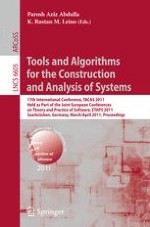2011 | Buch
Tools and Algorithms for the Construction and Analysis of Systems
17th International Conference, TACAS 2011, Held as Part of the Joint European Conferences on Theory and Practice of Software, ETAPS 2011, Saarbrücken, Germany, March 26–April 3, 2011. Proceedings
herausgegeben von: Parosh Aziz Abdulla, K. Rustan M. Leino
Verlag: Springer Berlin Heidelberg
Buchreihe : Lecture Notes in Computer Science
